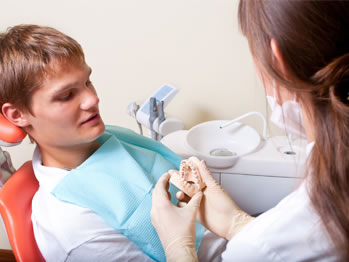Periodontal Treatments – Plymouth, MI
Treatment Options
If you've been diagnosed with gum disease, there are a variety of treatment options depending on the details of your situation and the severity of the problem. We always start with the least invasive options, which are non-surgical. However, in more serious cases, surgery may be necessary.
Non-Surgical Treatment
The first line of defense against gum disease is a unique type of cleaning called “scaling and root planing.” In this procedure, an ultrasonic cleaning device is used to remove plaque and tartar from your teeth where regular cleaning devices can't reach: under the gum line, on the tooth, and around the root. Then, the rough surface of the tooth and the root are smoothed out (planed). This provides a healthy, clean surface that makes it easier for the gum tissue to reattach to the tooth.
If you address your gum disease before it becomes severe, scaling and root planing may be the only treatment you need. However, as with any dental procedure, after-care is vital. In order to keep your teeth in good shape and resist future occurrences of gum disease, you must brush and floss daily, eat a healthy diet, avoid tobacco use, and have regular dental checkups. Even after a successful scaling and root planing, if you don't attend to your teeth properly, it's quite likely that you'll develop gum disease again.
Surgical Treatment Options
If the tissue or bone surrounding your teeth is too damaged to be repaired with non-surgical treatment, several surgical procedures are available to prevent severe damage and to restore a healthy smile. We will recommend the procedure that is best suited to the condition of your teeth and gums. Following is a list of common types of periodontal surgery:
-
Pocket Depth Reduction
In a healthy mouth, the teeth are firmly surrounded by gum tissue and securely supported by the bones of the jaw. Periodontal disease damages these tissues and bones, leaving open spaces around the teeth that we call pockets. The larger these pockets are, the easier it is for bacteria to collect inside them, leading to more and more damage over time. Eventually the supportive structure degrades to the point that the tooth either falls out or needs to be removed.During pocket reduction procedures (also known as “flap surgery”), we fold back the gum tissue and remove the bacteria hiding underneath, as well as the hardened plaque and tartar that have collected. We may also remove any tissue that is too damaged to survive. We then sew the healthy tissue back into place. Now that the tooth and root are free of bacteria, plaque, and tartar, and the pockets have been reduced, the gums can reattach to the teeth.
-
Regeneration
When the bone and tissue supporting the teeth have been lost due to severe gum disease, we can restore these areas with a regeneration procedure. During this process, we begin by folding back the gum tissue and removing the bacteria, plaque, and tartar. Depending on your situation, we may then perform a bone graft to stimulate new bone growth, or we may apply a special kind of protein that stimulates tissue growth to repair the areas that have been destroyed by the disease. -
Soft-Tissue Graft
A frequent symptom of gum disease is gum recession (also called gingival recession). As the gums recede, more of the roots are revealed. This can make teeth appear longer and can also create sensitivity to hot or cold liquids or food. It also exposes the tooth to increased damage from gum disease, as bacteria, plaque, and tartar attack the surface of the tooth and the root.During a soft-tissue graft, tissue from the top of your mouth or another source is sewed to the gum area, covering the roots and restoring the gum line to its original, healthy location. This procedure can also be performed for cosmetic reasons.








